BANK OF ALBANIA
PRESS RELEASE
Governor Sejko: Welcoming remarks at the launching of the EBRD Transition Report 2023-24
Publication date: 29.01.2024
Dear participants,
The Bank of Albania, for years now, has turned it into tradition hosting the European Bank for Reconstruction and Development in one of the most important events in its schedule of activities: the launching of the Transition Report. This report, which opens the door to professional economic analysis for the year, is of great importance. The analyses, conclusions and recommendations provided in it have always feed the economic debate, on the challenges that the time poses and on the appropriate development policies in order to achieve the fastest and most sustainable growth, the improvement of social well-being, as well as the economic and financial integration with our European partners, in turn strengthening resilience against shocks.
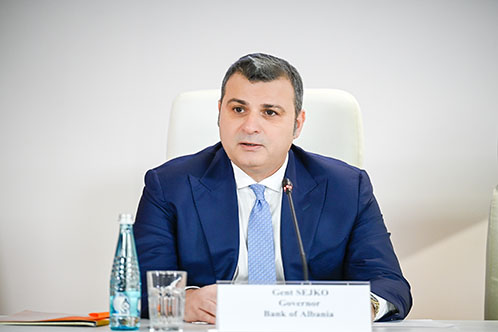
For these reasons, I am pleased that this year we are continuing this journey, with the presentation of the Transition Report for the period 2023-2024. This satisfaction is even greater when I find that this year's Report invites us to a moment of reflection. While our activity focuses on the issues of the day, the topic of this report, - “Transitions big and small', urges us to look further afield. The quality of life and the affecting-related factors, the new geopolitical realities and their consequences on the development strategies of countries in transition, climate change, global warming and the reduction of biodiversity, are undeniable realities with significant consequences, on economies also on our society and communities.
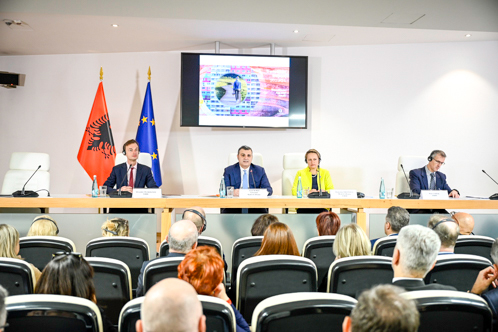
In this context, this year's Transition Report rightly has added value for its focus on the implications of transition on the structure of economies, on global supply and value chains, on climate change, on the need for sustainable access to raw materials, as well as on the living, working and well-being of the individual.
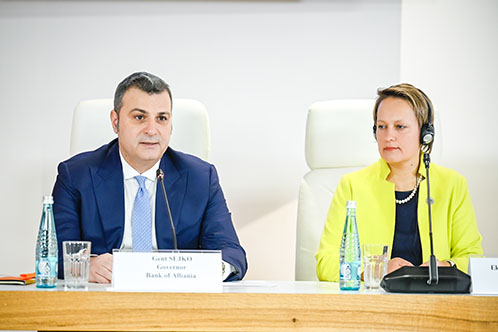
To this end, I would like to place some of the Report’s aspects in the context of the Albanian economy, in view of the messages found in this Report.
To begin with, let me emphasize that the Albanian economy has shown a good performance in the face of successive shocks of the last four years. The sound foundations of the Albanian economy, the flexibility of our private sector, coupled with the prudential macroeconomic policies we have implemented, have enabled a sustainable economic growth and an overall economic and financial stability. In particular, inflation has been coming down, financial markets appear calm, while the growth in employment and wages have supported households’ budgets. On the other hand, the banking sector appears sound, while access to finance and financial inclusion have improved. Compared to regional countries, Albania has one of the highest economic growth rates, the lowest inflation rates and the slowest increase in financing costs.
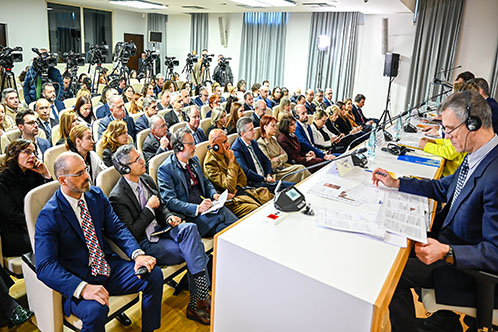
Despite the still challenging external environment, the economic prospect appears positive. This confidence is fuelled by a number of factors, among which I would like to emphasise: the sound balance sheets of the Albanian businesses and households; the stable financial environment; the credit support that the banking sector continues to provide for the expansion of consumption and investments, as well as the rapid boosting of tourism sector in recent years. In parallel, the concrete perspective in the European Union membership has helped to focus and accelerate our agenda of structural reforms.
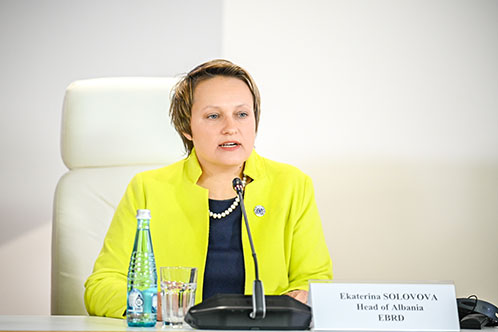
This positive landscape encourages us to be more far-sighted, to new challenges which are already turning into an increasingly tangible reality. Among the topics addressed in the Transition Report, I would like to dwell on that of climate change. Global warming and the increased frequency of climate-related natural disasters are weighing on all countries and economies, in an ever greater manner, whether advanced or developing, large or small ones. Despite the window for action is narrowing, the transition to a sustainable and green economy – in the interest of economic growth and of the natural and social systems themselves – is becoming an increasingly vital objective for many countries. However, while the challenge is clear to most decision makers, identifying how best to address this challenge in practice is still a work in progress.
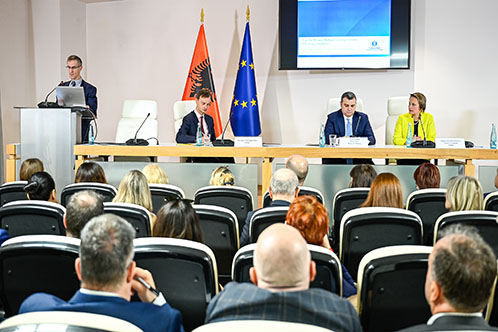
In this context, I find it appropriate to point out that the Global Adaptation Index, measured by the University of Notre Dame, ranks Albania among countries vulnerable to climate change. Likewise, the IMF’s assessments suggest that Albania has an average of one episode of natural disaster per year, which causes damages up to 1.3% of GDP and affects at least 1 in 200 inhabitants of the country. We are aware that climate change will have far-reaching implications for the economy, the financial system and the entire society. For this reason, public authorities should engage in concrete plans and strategies to minimize their impact and achieve sustainable economic and social development.
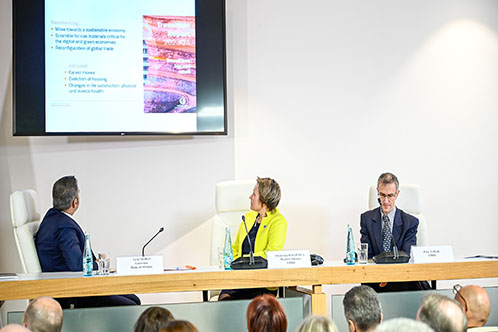
Although the central banks are not the primary actors who can facilitate the adaptation of the economy to climate change, the Bank of Albania has decided that - without prejudice to its legal mandate of price stability - to give its contribution in this regard. Our efforts are focused on three directions, as following:
- First, monitoring climate risks and strengthening our analytical capacities in this area. At the moment, we have to admit that there is a huge gap in climate-related data. However, overcoming it as soon as possible would establish premises to further improve our macroeconomic models, scenario analysis and risk assessment. In turn, this helps us better calculate climate risks and the implications that the transition to a carbon-neutral economy may have. In the last years, the Bank of Albania has increased the knowledge on the economic and financial consequences of climate change, through the scientific researches in this regard.
-
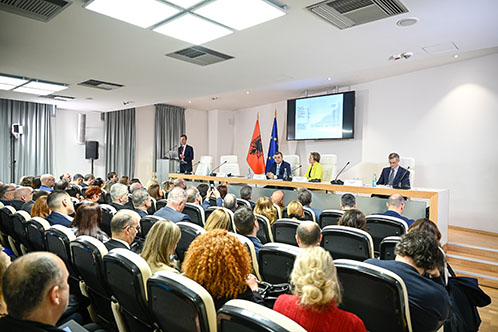
- Second, promoting green finance. To this end, we have recently approved the "Strategy for the Management of Financial Risks related to Climate Change, 2023-2025". The purpose of this strategy is making banks aware on the need to identify, measure and monitor the risk that comes from climate change, until the issuance of complete guidelines by the European Banking Authority for the inclusion of this risk in the supervisory processes. Meanwhile, in the current year we plan to draft a climate risk guideline in order to encourage banks to include climate risks in their framework on risk management. In this process, the alignment with the ECB initiatives will also be considered, taking into account the practices of other countries as well.
- Third, strengthening collaboration with national and international partners. Addressing risks of climate change and transitioning to a sustainable economy are global challenges. Therefore, the share of information, expertise, as well as the recognition and implementation of best practices to handle climate change, are crucial elements for successfully addressing this challenge. We work with the Albanian and international partners to increase knowledge, awareness and transparency on climate-related issues. Since 2020, the Bank of Albania is a member of the Network for a Green Financial NGSF), while we have been collaborating for a long time with the World Bank (FinSAC), the State Secretariat for Economic Affairs of the Swiss Government (SECO), Vienna Initiative, and others intuitions. We are also working to reduce our environmental impact by implementing measures to save energy.
Dear participants,
Thanking you for participating in the launching of the EBRD Regular Transition Report, I kindly invite you to become an active part of discussions on the messages it provides and try to reflect them as much as possible in our future work.

 Twitter
Twitter
 Youtube
Youtube
 Facebook
Facebook
 Flickr
Flickr
 RSS
RSS
 Subscribe
Subscribe
 Feedback
Feedback